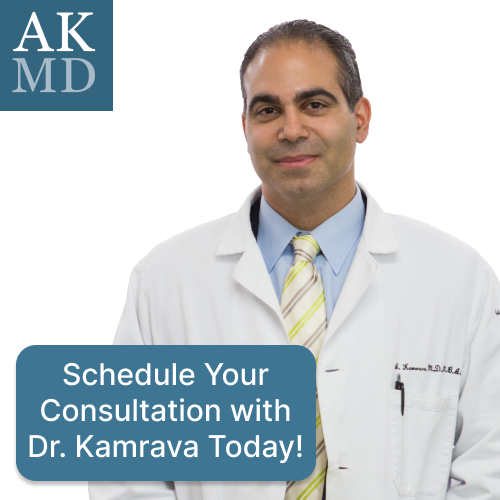Symptoms of different colorectal diseases are often similar, so it’s difficult to pinpoint your exact condition without seeing a specialist who has highly specialized training.
Dr. Kamrava is a fellowship-trained and board-certified colorectal surgeon whose ongoing clinical research includes methods of superior levels of care for patients who suffer from a variety of colorectal conditions, including advanced colorectal cancers, complex anal diseases, and inflammatory bowel disease.
Colorectal Conditions Treated by Dr. Kamrava
Learn more about the colorectal conditions that Dr. Kamrava treats:
Hemorrhoids
Hemorrhoids are one of the most common colorectal conditions. They are standard veins located at the junction of the rectum or anus. Over time, the veins can become swollen and enlarged. Physical symptoms of hemorrhoids include pain, itching, throbbing, and bleeding.
Pilonidal Disease
A pilonidal cyst forms when hair enters openings in the skin. Pilonidal disease affects the lowest area of the back near the tailbone. A bump over the tailbone near the buttocks is the most prominent physical symptom of the disease. Pus within the bump may be drained, but to address the source of pilonidal cysts, surgery is necessary to remove the diseased skin tissue.
Fissures
Anal fissures are small tears in the lining of the anus. Anyone can develop anal fissures, and they occur in both men and women. The fissures disrupt the skin of the anus and cause physical symptoms that typically will be noticed during or after a bowel movement. Pain and blood are typical symptoms of these tears.
Fistulas
Anal fistulas may first appear as a simple perianal abscess. At the lower end of the anus, there are small crypts that allow for the deposition of necessary fluids within the canal. Fistula tracts form when stool impacts one of these crypts and burrows an aberrant tract into adjacent tissue. The entire fistula tract must be removed in order to properly treat the colorectal condition.
Colon Cancer
When colon cancer is not detected and treated in its early stages, symptoms include bloody stool, abdominal pain, diarrhea, unusual bowel habits, weakness, fatigue, rectal bleeding, and sudden weight loss. Screenings for colon cancer before any symptoms develop is the best way to detect the disease early. For individuals over the age of 50, colonoscopies should be performed every 10 years.
Rectal Cancer
Similar to colon cancer, rectal cancer that is detected early is a highly treatable colorectal condition. Cancerous polyps that form in the rectum may develop into cancerous masses if left untreated. A colonoscopy monitors the rectum—the last six inches of the digestive tract—for any irregular growths. If present, these growths can be removed and assessed before they have a chance to develop further.
Anal Cancer
Cancerous tumors may form in the anus. Although anal cancer is less common than colon cancer or rectal cancer, symptoms of the disease are similar. Routine screenings for anal cancer are not a common practice, but abnormalities in the anus that require further investigation may be found during a colonoscopy.
Anal Warts
An individual infected with the human papilloma virus (HPV), may develop anal warts. Anal warts look like small, flesh-colored bumps and often produce no other symptoms. If left untreated, they may grow overtime and can be passed from person to person through physical contact.
 Gallstones
Gallstones
Gallstones form when bile hardens into solid concretions within the gallbladder. They may exist for years without any symptoms, but an individual may become aware of the presence of gallstones when he or she experiences a “gallbladder attack” after a large meal. Sharp pain in the upper-right portion of the abdomen that can last up to several hours may indicate a gallbladder attack.
Lipomas
A lipoma is the most common non-cancerous soft tissue growth. Fat cells may grow in a thin, fibrous capsule just under the skin without the presence of cancer. If lipomas become bothersome, removal is an option. Excessive pain, tenderness, infection, inflammation, or foul-smelling discharge may prompt lipoma removal.
Hernias
A lump or bulge under the skin that occurs after heavy lifting may be a sign of a hernia. A hernia indicates that an organ or tissue has ruptured from its standard location. In order to correct the condition, hernia surgery will need to be performed.
Stop Wondering, Get Answers – Schedule a Consultation With Dr. Kamrava Today!
If you’re experiencing symptoms of any of the above colorectal conditions, Dr. Kamrava will address your concerns with helpful and straightforward answers. To make an appointment with the expert colorectal surgeon, call 424.279.8222!
Next, learn about our colorectal treatment options.




